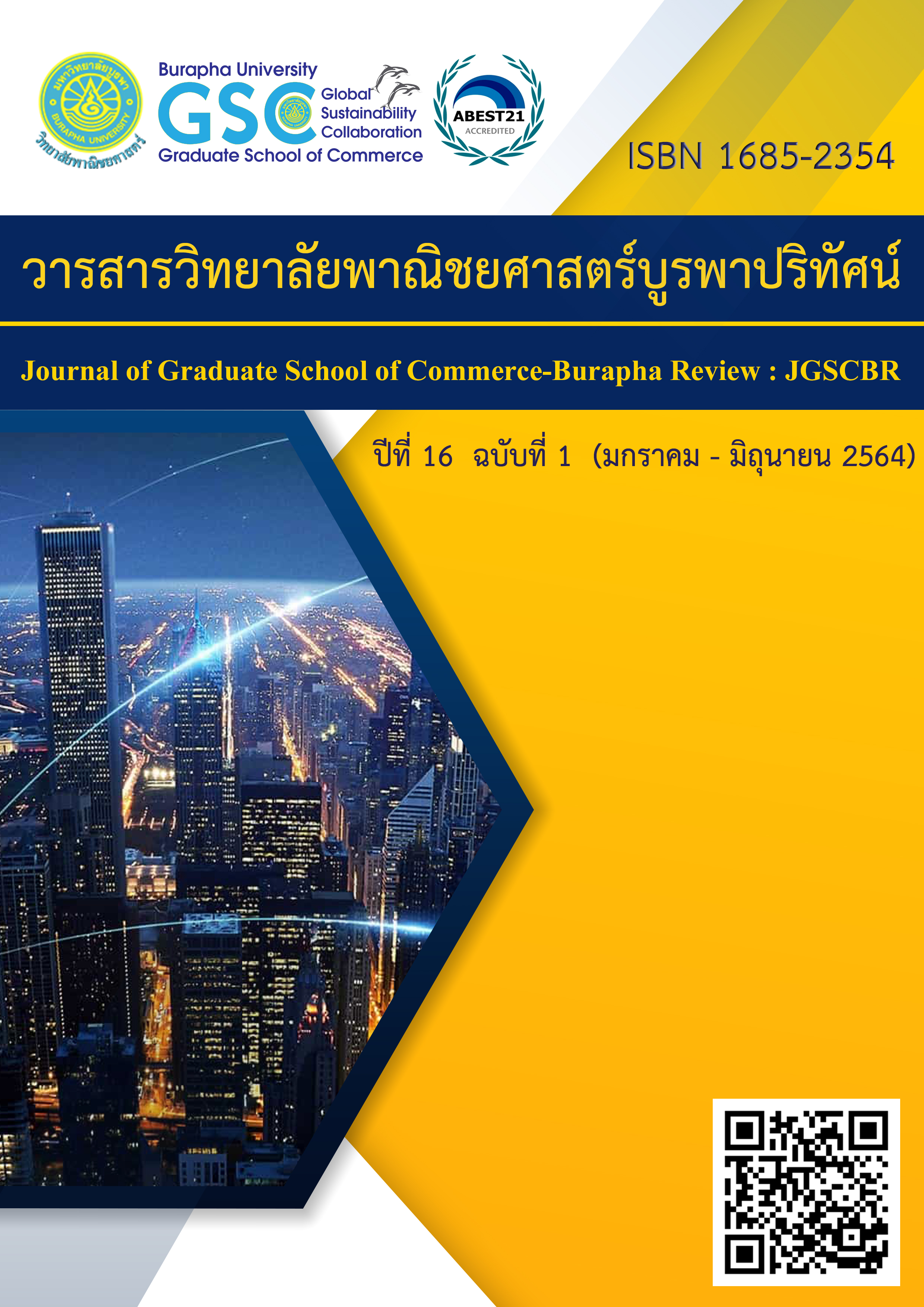THE EFFECTS OF WORKLOAD AND WORK STRESS ON THE INTENTION TO QUIT OF PERSONNEL AT THE REVENUE DEPARTMENT
Main Article Content
Abstract
This research aims to study 1) the effect of workload on work stress, quality of work life, work engagement, and intention to quit, 2) the effect of work stress on quality of work life, work engagement, and intention to quit, 3) the effect of quality of work life on work engagement, and intention to quit, and 4) the effect of work engagement on intention to quit. A questionnaire is used for collecting data. The participants are 600 personnel who work under the Central and Regional Revenue Department. The researcher applies Structural Equation Modeling analysis using the computer software program. The results are as follows: 1) workload has a positive effect on work stress and negative effect on intention to quit significantly but it has no any effects on quality of work life and work engagement directly, 2) work stress has a negative effect on intention to quit significantly but has no any effects on quality of work life and work engagement directly, 3) quality of work life has a positive effect on work engagement and has a negative effect on intention to quit significantly, and 4) work engagement has a negative effect on intention to quit significantly, respectively.
Article Details
The owner of the article does not copy or violate any of its copyright. If any copyright infringement occurs or prosecution, in any case, the Editorial Board is not involved in all the rights to the owner of the article to be performed.
References
พฤษภาคม 2563, จาก https://www.rd.go.th/publish/282.0.html
ปรียาพร วงศ์อนุตรโรจน์. (2553). จิตวิทยาการบริหารงานบุคคล. กรุงเทพฯ: ศูนย์สื่อเสริมกรุงเทพ.
สาคร กิ่งจันทร์, ชวนชัย เชื้อสาธุชน, และอัศวฤทธิ์ อุทัยรัตน์. (2557). ปัจจัยที่ส่งผลต่อคุณภาพชีวิตในการทำงาน
ของครูโรงเรียนเอกชนในภาคตะวันออกเฉียงเหนือ. วารสารศึกษาศาสตร์มหาวิทยาลัยสงขลานครินทร์
วิทยาเขตปัตตานี, 25(1), 82-97.
Abbasi, T.F. (2015). Impact of work overload on stress, job satisfaction, and turnover intentions
with moderating role of Islamic work ethics. Management Studies and Economic
Systems, 2(1), 27-37.
Alsaqri, S.H. (2014). A survey of intention to leave, job stress, burnout and job satisfaction
among nurses employed in the Ha’il Region’s Hospitals in Saudi Arabia. A thesis for
the degree of Doctor of Philosophy, RMIT University.
Amran, F.W., Ghazali, H., and Hashim, S. (2019). Influence of working environment, workload and
job autonomy towards job stress: A case of casual dining restaurant employees in Klang
Valley, Malaysia. International Journal of Academic Research in Business and Social
Sciences, 9(5), 744-755.
Bothma, F.C., and Roodt, G. (2012). Work-based identity and work engagement as potential
antecedents of task performance and turnover intention: Unravelling a complex
relationship. SA Journal of Industrial Psychology, 38(1), 1-17.
Casio, W.F. (2003). Managing human resources: Productivity, quality of work life, profits (6thed.).
New York: McGraw-Hill.
Diamantopoulos, A., and Siguaw, J.A. (2000). Introducing LISREL. London: Sage.
Erat, S., Kitapçi, H., and Comez, P. (2017). The effect of organizational loads on work stress,
emotional commitment, and turnover intention, International Journal of
Organizational Leadership, 6(1), 221-231.
Gonçalves, A., Gomes, A.R., and Simães, C. (2019). Stress and work engagement in health
professionals. Occupational and Environmental Safety and Health. Studies in Systems,
Decision and Control, 202(1), 553-561.
Hair, J.F., Black, W.C., Babin, B.J., and Anderson, R. E. (2010). Multivariate data analysis (7thed.).
New Jersey: Prentice Hall.
Islam, M.B. (2012). Factors affecting quality of work life: An analysis on employees of private
limited companies in Bangladesh. Global Journal of Management and Business
Research, 12(18), 23-31.
Knott, J. (1993). Comparing public and private management: Cooperative effort and principal-
agent relationships. Journal of Public Administration Research and Theory, 3(1), 93-119.
Kokoroko, E., and Sanda, M.A. (2019). Effect of workload on job stress of Ghanaian OPD nurses:
The role of co-worker support. Safety and Health at Work, 10(1), 341-346.
Komari, N., and Sulistiowati, S. (2019). Factors affecting the intention of Millennial Workers in
Indonesia to leave. Journal of Business and Economics Review, 4(2), 83-89.
Kotler, P., and Keller, K.L. (2011). Marketing Management (14thed.). New Jersey: Prentice Hall.
Lai, S.L., Chang, J., and Hsu, L.Y. (2012). Does effect of workload on quality of work life vary with
generations? Asia Pacific Management Review, 17(4), 437-451.
Mosadeghrad, A.M. (2013). Quality of working life: An antecedent to employee turnover intention.
International Journal of Health Policy and Management, 1(1), 43-50.
Nekzada, N., and Tekeste, S. F. (2013). Stress causes and its management at the work place: A
qualitative study on the causes of stress and management mechanisms at Volvo
Trucks AB, Umeå. Umeå, Sweden: Umeå School of Business and Economics.
Pradana, A., and Salehudin, I. (2013). Role of work overload toward turnover intention among
newly hired public accountants. In 8th International Conference on Business and
Management Research (pp. 1-16). Seoul, South Korea: FLE Learning.
Qureshi, M.I., Jamil, R.A., Iftikhar, M., Arif, S., Lodhi, S., Naseem, I., et al. (2012). Job stress,
workload, environment and employees turnover intentions: Destiny or choice. Archives
Des Sciences, 65(8), 230-241.
Rakesh, K.B., and Thomas, B. (2016). An empirical study on perceived quality of work life and
turnover intention among the employees of private hospitals. International Journal of
Latest Trends in Engineering and Technology. Special issue SACIAM 2016, 511-519.
Sahni, J. (2019). Role of quality of work life in determining employee engagement and
organizational commitment in telecom industry. International Journal for Quality
Research, 13(2), 285-300.
Siddiqi, M.A. (2013). Examining work engagement as a precursor to turnover intentions of service
employees. International Journal of Information and Management, 5(4), 118-133.
Thian, J.H.M., Kannusamy, P., He, H.J., and Yobas, P.K. (2015). Relationships among stress, positive
affectivity, and work engagement among registered nurses. Psychology, 6(1), 159-167.
Tomic, M., and Tomic, E. (2011). Existential fulfilment, workload and work engagement among
nurses. Journal of Research in Nursing, 16(5), 468-479.
Van Mol, M.M.C., Nijkamp, M.D., Bakker, J., Schaufeli, W.B., and Kompanje, E.J.O. (2018).
Counterbalancing work-related stress? Work engagement among intensive care
professionals. Australian Critical Care, 31(1), 234-241.


